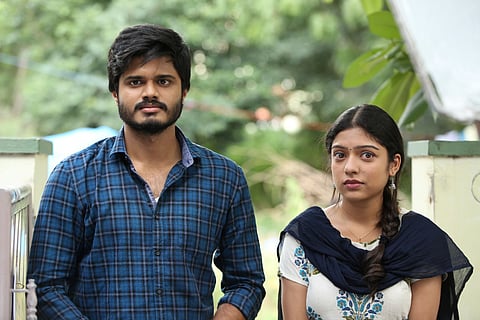

The trailer of Middle Class Melodies, the latest Telugu film to release on OTT, indicates that the food of Guntur plays a major role in the film, parallel to the lead roles played by Anand Deverakonda and Varsha Bollamma. Directed by Vinod Anantoju, the film released on Amazon Prime Video on Friday. TNM spoke to the director and the lead actors about the significance of food in the film, working with hyperlocal theatre artists who play most of the supporting roles, and showing Guntur in a new light.
‘The Guntur Song’ from Middle Class Melodies looks like a comfort food video you might come across on YouTube or TikTok. But food has a bigger role in the film, beyond aesthetics, says debut director Vinod. The film tells the story of a man named Raghava (Anand), who moves to Guntur city from a village called Kolakaluru. Armed with his mother’s recipe for Bombay Chutney, which is popular in his village, he wants to make it big in Guntur by setting up a food joint.
“Guntur’s street food culture is very important to the film. Raghava is an outsider to the city, and he wants to come and make his own mark in an already flourishing food industry. So it was very important to showcase this strong local food culture,” says Vinod.
It helped that Vinod and Janardhan Pasumarthi, who wrote the dialogues for the film, grew up in Guntur. “I know every food joint in every street corner, and I wanted to dedicate a part of the film to Guntur. So I created this song,” Vinod says, adding that all the places and foods referenced in the song — like the Pulihora dosa in Brodipet and Gongura chicken in Brundavanam — are places that he would visit regularly with his friends.
The filmmakers have made efforts to keep the film rooted in Guntur, from workshopping the dialect with the lead actors to recruiting most of the supporting cast from the local theatre circuits. Vinod says that the casting process was very difficult, as most of the theatre groups are hyperlocal and are not well-known throughout Andhra. “We had to go to many villages and towns to meet theatre groups. I used to go watch plays wherever they happened in Andhra, and it took us 2-3 months to find a good number of artists. And then we had to work with the artists to help them adapt to film, as they are used to a body language, dialogue delivery and modulation meant for theatre. It was a lengthy process, but I felt that only fresh, local actors would do justice to this story,” says Vinod.
Varsha, who is known for her role in the Tamil film 96 and its Telugu remake Jaanu, and also appeared in Bigil, had to learn the local Guntur dialect even as she is still learning Telugu. Speaking about her choice to dub for herself even though she is still in the process of learning Telugu, Varsha says, “I have huge respect for dubbing artists. But I feel even when I dub for myself, I’ll not be able to perform the way I did during the shoot. There’s a lot of emotion that gets left out. So I personally feel that if I don’t dub for myself, it makes my performance feel a little incomplete.”
Her character in the film, Sandhya, is a simple girl with a lot of emotions, who is not able to express herself to her parents, Varsha says. “Sandhya has trouble standing up for herself. I’m sure a lot of girls will be able to connect to the character,” the actor says.
In spite of knowing Telugu, Anand, who grew up in Hyderabad, also had to make an effort to learn the Guntur dialect. “Guntur as a place is the soul of the movie. The food, the hustle-bustle, the music, all of them add a lot of character to the place. You’ll see a completely new Guntur that I wasn’t actually aware of until we went there and shot,” says Anand.
Vinod says that he and writer Janardhan first came up with the title for the film, and then wove a story around it inspired from real-life characters and incidents. When asked about the term middle-class itself, Vinod says, “Most people think they’re middle class, I’m not sure if there’s a clear definition. But I feel that when it comes to on-screen portrayal of the middle-class, especially in the Telugu industry, it’s done in a very stereotypical way. It’s either overdramatised, or the upper middle-class is shown as the middle-class. I wanted to show the highs and lows in middle-class families, along with their innate humour, as I saw them while growing up,” he says.
Vinod says that he draws inspiration from filmmakers like Jandhyala and Bapu, for taking the stories of very common people and making them cinematic. “We generally use the term cinematic to mean dramatised or larger than life. But these directors took the stories of common people and made it so presentable that even today we can watch their movies and relate to the characters. I wanted to achieve something like that, to bring out the stories of common people in small towns and showcase them on the big screen. I strongly feel their stories also have the potential to draw crowds,” he says.
Going forward, Anand says that he aspires to be part of a movie like Kumbalangi Nights. “That’s my favourite film from Indian cinema ever, I just fell in love with it,” he says. Varsha, on the other hand, says she would like to be part of a psychological thriller.
Vinod, who was influenced by Telugu literature before he started making films, says that he would like to adapt the literary works of Dr Kesava Reddy into film. “His novels, like Athadu Adavini Jayinchadu or Chivari Gudise or Munemma, have the potential to be made into fantastic films,” says the director.